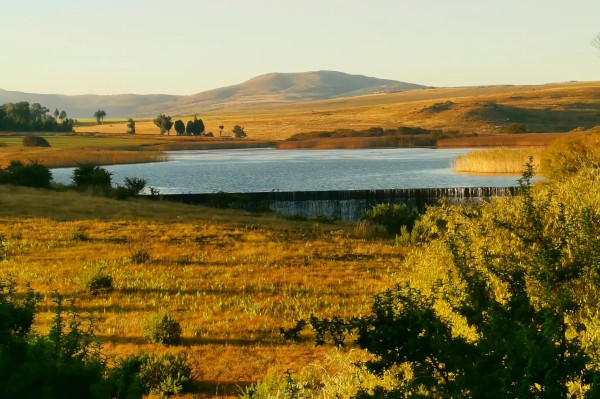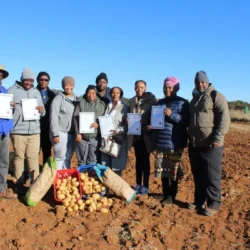With help from the WWF Nedbank Green Trust, female farmers in rural communities are improving food production and securing their livelihoods, while expanding South Africa’s protected areas to combat climate change and disasters.
Ayanda Cele, the manager of WWF-SA’s land reform and biodiversity stewardship programme, says the Covid-19 pandemic exposed millions of South Africans to food and livelihood vulnerabilities.
As a result, it prompted proactive engagements with communities leading to food gardens being planted and farmers being encouraged to pursue methods that fight climate change, build resilience and promote self-reliance.
“There are approximately two million smallholder farmers in South Africa, many of whom farm communally,” says Cele. These farmers rely entirely on land and need to become more resilient to dramatic social and environmental impacts such as the pandemic and climate change.
Cele and her team worked with women farmers in the communities of Thekwane and Mgundeni in KwaZulu-Natal and Bambanani and Ukuthanda Ukukhanya in Mpumalanga for a project themed “Enabling community resource security and protected area expansion post-Covid-19”.
“The farmers established environmentally friendly, climate-resilient vegetable gardens to feed their families and sell the surplus to the neighbouring towns and communities,” Cele explains.
A crucial aspect of the project is that it is specifically aimed at rural women who care for the elderly, the ill and the orphaned in their communities. They do not own or generate income from livestock.
Tobie Badenhorst, head of group sponsorships and cause marketing at Nedbank, says the farmers receive training in agroecology and financial management. Badenhorst says current and future challenges require them to share skills and equipment and become involved in networks. This boosts their ability to survive, adapt and thrive.
“Agricultural ecology includes mixed farming (livestock, crops and vegetables) in harmony with the natural environment, as well as improving soil without chemicals and using water economically,” explains Badenhorst.
“To underpin the sustainability of this project in both KwaZulu-Natal and Mpumalanga, we have strengthened partnerships between these communities and the conservation sector, municipalities and the Department of Health.”
A broader project designed to protect water source areas at the top of the catchment is also being undertaken, according to Badenhorst. To achieve this, the WWF Nedbank Green Trust is working with communities to restore wetlands and grasslands through conservation-oriented rangeland management practices.
Water management depends on healthy grasslands, soils and wetlands, which slow down the flow of water from the top of the catchment that recharges rivers and streams. They form a landscape sponge system through which water is absorbed in these areas and released slowly. This promotes the improvement and sustainability of livestock and indigenous plants and animals. Overgrazing and poor water management, however, result in land degradation and soil erosion.
Cele says they are working with communities and landowners in KZN, Mpumalanga and the Eastern Cape to implement land-use management approaches that are conservation-compatible and economically beneficial.
One of the notable examples is the communal grazing system at Mgundeni in Utrecht, KZN, led by Inkosi Mabaso, the traditional leader. “They use 18 camps where they follow a rotational grazing model that improves grasses, with stocks aligned with the land’s carrying capacity and some camps reserved for winter grazing only,” says Cele.
Traditional leaders and communal farmers in the Matatiele district of the Eastern Cape have formed grazing associations, she says. They practise rotational grazing and resting, as well as fast-rotation, high-density grazing. The WWF Nedbank Green Trust has teamed up with Environmental and Rural Solutions, a local non-profit.
As a result, the region’s wetlands and grasslands have improved, which in turn has improved the quality and quantity of water in the uMzimvubu River which flows through Matatiele. This means more money at auction for farmers.
In Matatiele, grazing associations and communities have partnered to establish the proposed Maloti Thaba Tsa Metsi Protected Environment, a 29,824-hectare area in the upper Umzimvubu watershed. This is one of several areas that will soon be declared protected environments, thanks to WWF Nedbank Green Trust funding.
Cele says there are already two protected environments: the Mkhothane Community Protected Environment in KZN, covering 2,600ha, and the Afrikan Farms Protected Environment in Mpumalanga, covering 1,563ha.
The declaration for the Mgundeni protected environment is in progress. “This is all part of the expansion of South Africa’s protected areas footprint, and we hope to spread the knowledge and best practices gained to more parts of the country,” Cele says.




